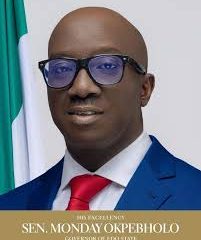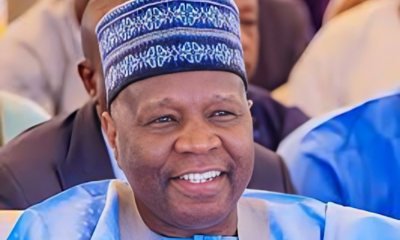Economy
Minister Inaugurates Working Group For Development Plan – Agenda 2050

By Tony Obiechina, Abuja
Minister of State for Budget and National Planning, Prince Clem Ikanade Agba, has inaugurated a Technical Working Group (TWG) on Macroeconomic Framework and Growth Diagnostics for the Development of Nigeria Agenda 2050 and the Medium Term National Development Plan (MTNDP 2021-2025).
Inaugurating the group through a virtual forum, the Minister said the initiatives were designed to succeed the current Nigeria Vision 20:2020 and the Economic Recovery and Growth Plan (ERGP 2017 – 2020) respectively.
According to a statement by the Ministry’s Director of Information, Mrs Victoria Agba-Attah, the framework would address development challenges in all aspects of the country’s national life within the agreed time horizon.
Prince Agba stated that inauguration of the group became imperative given the fact that the existing plans were expected to lapse in December 2020 and the 2021 Budget was to be guided by the Framework.
‘’Therefore, there is limited time to deliver on the task at hand’,’ the Minister said.
In selecting members of the Group who were drawn from relevant ministries, parastatals and the private sector, Prince Agba informed that individual wealth of experience, expertise and dedication to national assignment over the years were considered.
The Group’s terms of reference include, to prepare a robust and broad-based Macroeconomic Framework to facilitate the development of the Nigeria Agenda 2050 and Medium Term National Development Plan (MTNDP 2020-2025); improve on the work of the technical staff of the Ministry with necessary adjustments; and consider existing macroeconomic models for the Nigerian economy, identify and employ the right model or a mix of models for the preparation of the Macroeconomic framework.
The Group is also expected to conduct proper growth diagnostics on the Nigerian economy, taking into consideration the current and future global and local economic peculiarities; review the assumptions, parameters and forecasts used for previous macroeconomic frameworks that guided the Medium Term Plans and Annual Budgets and make necessary adjustments in line with current realities; consult relevant Ministries, Departments and Agencies for the needed data and validate the ones collated by the Ministry, amongst others.
Earlier in her remarks, the Permanent Secretary of the Mrs. Olusola Idowu, disclosed that the Ministry had identified 26 broad and key thematic areas of the economy on which TWGs had been set up.
She noted that the Macroeconomic framework and Growth Diagnostics had been recognized as the fulcrum upon which the work of all other TWGs would depend, adding that the work and output of the Group would determine how complete and robust the plans being envisaged by Government would be.
Idowu therefore charged members of the Group to deploy their wealth of experience, skills and expertise in delivering a robust Macroeconomic Framework.
Responding on behalf of his colleagues, the Chairman of the 30-member TWG, who is also the Special Adviser to President (Economic Matters) Office of the Vice President, Ambassador Adeyemi Dipeolu, appreciated the Ministry for appointing them for the very important national assignment.
He, however, appealed to the Minister to provide a Secretariat and necessary logistics for the successful execution of the assignment.
Economy
We’ll Continue Borrowing Within Sustainable Limits- FG

The Federal Government says it will continue to borrow within manageable and sustainable limits in accordance with the Debt Management Office (DMO) debt sustainability framework.
This is contained in a statement by the Director, Information and Public Relations in the Ministry of Finance, Mr Mohammed Manga, in Abuja on Wednesday.
President Bola Tinubu recently requested the approval of the 2024 – 2026 external borrowing rolling plan from the National Assembly.
Tinubu has requested the National Assembly’s approval to secure external loans of 21.5 million dollars and 15 billion Yuan, along with a grant of 65 million Euro, as part of the federal government’s proposed 2025–2026 external borrowing plan.
Manga said that the proposed borrowing plan was an essential component of the Medium-Term Expenditure Framework (MTEF) in accordance with both the Fiscal Responsibility Act 2007 and the DMO Act 2003.
“The plan outlines the external borrowing framework for both the federal and sub-national governments over a three-year period, accompanied by five detailed appendices on the projects, terms and conditions, implementation period, etc.
“By adopting a structured, forward-looking approach, the plan facilitates comprehensive financial planning and avoids the inefficiencies of ad-hoc or reactive borrowing practices.
“This strategic method enhances the country’s ability to implement effective fiscal policies and mobilise development resources,” he said.
According to the statement, the borrowing plan does not equate to actual borrowing for the period.
“The actual borrowing for each year is contained in the annual budget. In 2025, the external borrowing component is 1.23 billion dollars, and it has not yet been drawn.
“This is planned for H2 2025, the plan is for both federal and several state governments across numerous geopolitical zones including Abia, Bauchi, Borno, Gombe, Kaduna, Lagos, Niger, Oyo, Sokoto, and Yobe States.
“Importantly, it should be noted that the borrowing rolling plan does not equate to an automatic increase in the nation’s debt burden.
“The nature of the rolling plan means that borrowings are split over the period of the projects, for example, a large proportion of projects in the 2024–2026 rolling plan have multi-year drawdowns of between five to seven years which are project-tied loans,” Manga said.
He said that these projects cut across critical sectors of the economy, including power grids and transmission lines, irrigation for improving food security, fibre optics network across the country, fighter jets for security, rail and road infrastructure.
According to him, the majority of the proposed borrowing will be sourced from the country’s development partners, like the World Bank, African Development Bank, French Development Agency, European Investment Bank, JICA, China EximBank, and the Islamic Development Bank.
Manga said that these institutions offer concessional financing with favourable terms and long repayment periods, thereby supporting Nigeria’s development objectives sustainably.
He said that the government seeks to reiterate that the debt service to revenue ratio has started decreasing from its peak of over 90 per cent in 2023.
Manga said that the government has ended the distortionary and inflationary ways and means.
According to him, there is significant revenue expectations from the Nigerian National Petroleum Corporation Limited (NNPC Ltd), technology-enabled monitoring and collection of surpluses from government owned enterprises and revenue-generating ministries, departments, and agencies and legacy outstanding dues.
“Having achieved a fair degree of macroeconomic stabilisation, the overarching goal of the federal government is to pivot the economy onto a path of rapid, sustained, and inclusive economic growth.
“Achieving this vision requires substantial investment in critical sectors such as transportation, energy, infrastructure, and agriculture.
“These investments will lay the groundwork for long-term economic diversification and encourage private sector participation.
“Our debt strategy is therefore guided not solely by the size of our obligations, but by the utility, sustainability, and economic returns of the borrowing,” he said.(NAN)
The Federal Government says it will continue to borrow within manageable and sustainable limits in accordance with the Debt Management Office (DMO) debt sustainability framework.
This is contained in a statement by the Director, Information and Public Relations in the Ministry of Finance, Mr Mohammed Manga, in Abuja on Wednesday.
President Bola Tinubu recently requested the approval of the 2024 – 2026 external borrowing rolling plan from the National Assembly.
Tinubu has requested the National Assembly’s approval to secure external loans of 21.5 million dollars and 15 billion Yuan, along with a grant of 65 million Euro, as part of the federal government’s proposed 2025–2026 external borrowing plan.
Manga said that the proposed borrowing plan was an essential component of the Medium-Term Expenditure Framework (MTEF) in accordance with both the Fiscal Responsibility Act 2007 and the DMO Act 2003.
“The plan outlines the external borrowing framework for both the federal and sub-national governments over a three-year period, accompanied by five detailed appendices on the projects, terms and conditions, implementation period, etc.
“By adopting a structured, forward-looking approach, the plan facilitates comprehensive financial planning and avoids the inefficiencies of ad-hoc or reactive borrowing practices.
“This strategic method enhances the country’s ability to implement effective fiscal policies and mobilise development resources,” he said.
According to the statement, the borrowing plan does not equate to actual borrowing for the period.
“The actual borrowing for each year is contained in the annual budget. In 2025, the external borrowing component is 1.23 billion dollars, and it has not yet been drawn.
“This is planned for H2 2025, the plan is for both federal and several state governments across numerous geopolitical zones including Abia, Bauchi, Borno, Gombe, Kaduna, Lagos, Niger, Oyo, Sokoto, and Yobe States.
“Importantly, it should be noted that the borrowing rolling plan does not equate to an automatic increase in the nation’s debt burden.
“The nature of the rolling plan means that borrowings are split over the period of the projects, for example, a large proportion of projects in the 2024–2026 rolling plan have multi-year drawdowns of between five to seven years which are project-tied loans,” Manga said.
He said that these projects cut across critical sectors of the economy, including power grids and transmission lines, irrigation for improving food security, fibre optics network across the country, fighter jets for security, rail and road infrastructure.
According to him, the majority of the proposed borrowing will be sourced from the country’s development partners, like the World Bank, African Development Bank, French Development Agency, European Investment Bank, JICA, China EximBank, and the Islamic Development Bank.
Manga said that these institutions offer concessional financing with favourable terms and long repayment periods, thereby supporting Nigeria’s development objectives sustainably.
He said that the government seeks to reiterate that the debt service to revenue ratio has started decreasing from its peak of over 90 per cent in 2023.
Manga said that the government has ended the distortionary and inflationary ways and means.
According to him, there is significant revenue expectations from the Nigerian National Petroleum Corporation Limited (NNPC Ltd), technology-enabled monitoring and collection of surpluses from government owned enterprises and revenue-generating ministries, departments, and agencies and legacy outstanding dues.
“Having achieved a fair degree of macroeconomic stabilisation, the overarching goal of the federal government is to pivot the economy onto a path of rapid, sustained, and inclusive economic growth.
“Achieving this vision requires substantial investment in critical sectors such as transportation, energy, infrastructure, and agriculture.
“These investments will lay the groundwork for long-term economic diversification and encourage private sector participation.
“Our debt strategy is therefore guided not solely by the size of our obligations, but by the utility, sustainability, and economic returns of the borrowing,” he said.(NAN)
Economy
Organise Informal Sector, Tax Prosperity Not Poverty, Adedeji Tasks Officials

The Chairman, Joint Tax Board (JTB), Dr Zacch Adedeji, has urged officials of the board to organise traders and artisans into a formal body before capturing them in the tax net.
Adedeji said that this was in line with the agenda of President Bola Tinubu not to tax poverty but prosperity.
The chairman stated this at the 157th Joint Tax Board meeting held in Ibadan, on Monday.
The theme of the meeting “Taxation of the Informal Sector: Potentials and Challenges”.
Speaking on the theme of the event, Adedeji stressed the need to evolve a system that would make the informal sector formal before it could be taxed.
Adedeji, who also doubles as the Chairman, Federal Inland Revenue Service, (FIRS), said “What I would not expect from the JTB meeting is to define a system that would tax the informal sector.
“The only thing is to formalize the informal sector, not to design a system on how to collect tax from market men and women.
“As revenue administrator, our goal is to organise the informal sector so that it can fit into existing tax law.”
Citing a report of the National Bureau of Statistics (NBS) in the first quarter of 2023, the chairman said that the nation’s unemployment index was attributable to recognised informal work.
Adedeji stated that workers in that sector accounted for 92.6 per cent of the employed population in the country as at Q1 2023.
“JTB IS transiting to the Joint Revenue Board with expanded scope and functions.
“We are hopeful that by the time we hold the next meeting of the Board, the Joint Revenue Board (Establishment) Bill would have been signed into Law by the President.
“The meetings of the board provide the platform for members to engage and brainstorm on contemporary and emerging issues on tax, and taxation,” he said.
In his address, Gov. Seyi Makinde of Oyo State, said the theme of the meeting was apt and timely, stressing that it coincides with the agenda of the state to improve on its internally generated revenue.
According to him, the meeting should find the best way forward in addressing the issue of the informal sector and balance the identified challenges.
“Nigeria is rich in natural resources, but it is a poor country because economic prosperity does not base on natural resources,”
Makinde also said that knowledge, skill and intensive production were required for economic prosperity, not just the availability of natural resources.
He stressed the need to move from expecting Federal Allocations to generating income internally.
“We are actively ensuring that people are productive and moving the revenue base forward,” Makinde said.
The governor said that tax drive should be done by simplifying tax processes, incentives for compliance like access to empowerment schemes and loans.
He urged JTB to deepen partnership and innovation in using data on tax to track and administer it.
Earlier, the Executive Chairman, Oyo State Board of Internal Revenue, Mr Olufemi Awakan, said the meeting was to address tax-related matters, evolve a workable, effective and
efficient tax system across the states and at the Federal level.
He urged participants to find amicable solutions to challenges of tax jurisdiction, among others.
Tax administrators from all the 36 states of the federation, who are members of JTB, were in attendance. (NAN)
Economy
Customs Zone D Seizes Contraband Worth N110m

The Nigeria Customs Service (NCS), Federal Operation Unit (FOU), Zone D, has seized smuggled goods worth over N110 million between April 20 till date.
The Comptroller of Customs, Abubakar Umar, said this at a news conference on Tuesday in Bauchi.
He listed the seized items to include 11,200 litres of petrol; 192 bales of second hand clothing, 140 cartons of pasta, 125 pairs of jungle boots, 47 bags of foreign parboiled rice and 9.
40 kilogramme of pangolin scales.Umar said the items were seized through increased patrols, intelligence-led operations, and strengthened inter-agency collaboration.
The comptroller said the pangolin scales would be handed over to the National Environmental Standards and Regulations Enforcement Agency (NESREA) for appropriate action, while the seized petrol would be auctioned, and the proceeds remitted to the federation account.
He attributed the decrease in smuggling activities of wildlife, narcotics, and fuel to the dedication and professionalism displayed by the personnel in line with Sections 226 and 245 of the NCS Act 2023.
The comptroller enjoined traders to remain law abiding, adding the service would scale up sensitisation activities to combat smuggling.
“We remain resolute in securing the borders and contributing to Nigeria’s economic development,” he said.
The FOU Zone D comprises Adamawa; Taraba, Bauchi, Gombe, Borno, Yobe, Plateau, Benue and Nasarawa. (NAN)




















